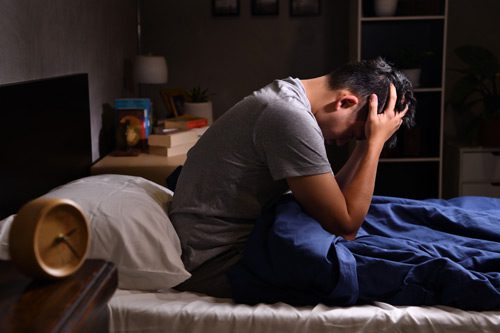
Insomnia & Addiction
Addiction and insomnia are often connected. Sometimes, chronic lack of sleep can lead to substance use in an attempt to self-medicate the problem (e.g., people may drink alcohol in hopes that it will help them sleep). Eventually, this substance use can lead to addiction. The opposite can also happen: substance use can lead to insomnia. Drugs and alcohol disrupt normal brain functioning, and as a result affect sleep quality and duration.
The following are signs of insomnia:
- Not being able to sleep or stay asleep
- Waking up in the middle of the night or early in the morning
- Sleeping for short amounts of time
- Problems concentrating
- Feeling depressed or anxious
Insomnia During Recovery
Not being able to get restful sleep can have a negative impact for those in recovery. You are not only tired, but you may anger easily, feel depressed, and be tempted to use drugs or alcohol. Lack of sleep can affect your relationships, your job, and your daily life. If you feel that you have a condition such as insomnia, seek the help of a professional before it jeopardizes your sobriety.
According to the Substance Abuse and Mental Health Service Administration (SAMHSA), sleep disorders such as insomnia are common among those with substance use disorders and can last months and even years into recovery. Sleep problems can be associated with relapse and should be treated seriously.
Insomnia can occur during recovery from drugs or alcohol for many reasons. It can be frustrating in recovery to feel exhausted and not be able to get enough sleep. In the early stages of recovery, people are more likely to have insomnia. This can be due to reasons such as:
- Lingering withdrawal symptoms. Those who quit drinking or quit using drugs such as marijuana or opiates often find it difficult to sleep and may suffer from insomnia in the early stages of recovery.
- Certain medications can contribute to insomnia. If you are taking a prescription medication, talk with your doctor about options for dealing with how it affects your sleep.
- After detoxing from drugs or alcohol, your body will take some time to establish and adjust to its normal sleep pattern. Insomnia can occur during this adjustment period.
Tips for Dealing with Insomnia
Consider the following tips to help you deal with insomnia and get a better night’s sleep:
- Get regular exercise to stay fit mentally and physically.
- Avoid caffeine before going to bed.
- Eat a healthy diet filled with nutritious foods.
- Stick to a nightly routine and give yourself time to wind down.
- Turn off the TV and other electronics.
- Create an ideal sleep environment.
If you are still struggling with insomnia and it is affecting your recovery, some treatment options may help with your condition. In addition to simple lifestyle changes, the following may be used to treat insomnia:
- Therapy. Cognitive behavioral therapy can help reduce anxiety that may contribute to insomnia.
- Meditation. Meditation can help you relax and reduce stress. It can often help you establish a sleep routine and make it easier to fall and stay asleep.
- Medication. While medication is not the preferred treatment for insomnia for those in addiction recovery, sometimes it may be necessary to use short-term to get the rest you need. Use medication only as a last resort and only as prescribed by your doctor. Be sure your doctor is aware of your history of substance use disorder.
Talk to a Professional Today
If you or a loved one is struggling with insomnia and addiction and are in search of a Pennsylvania recovery center, Mountain Laurel Recovery Center is here to help. We offer a variety of services to meet your personal needs as well as 12-step support and holistic treatments that can provide substance-free relief for sleep disorders. Contact us today.
